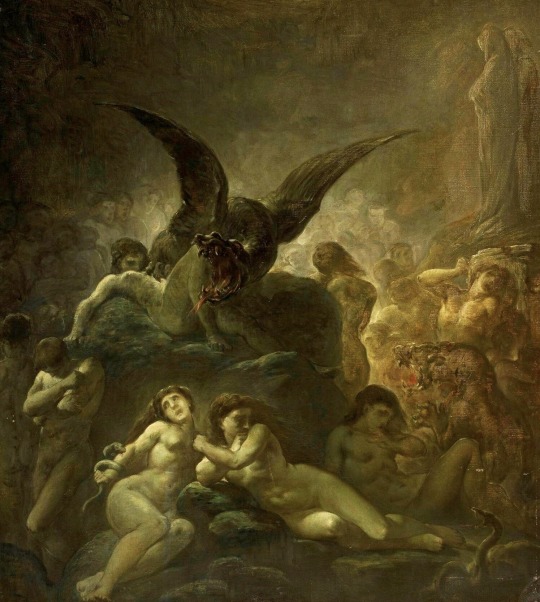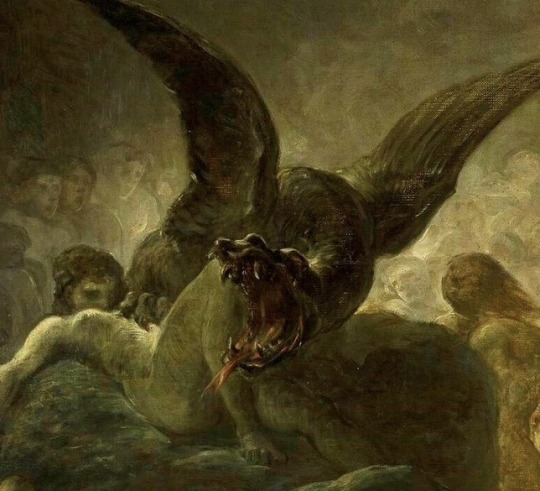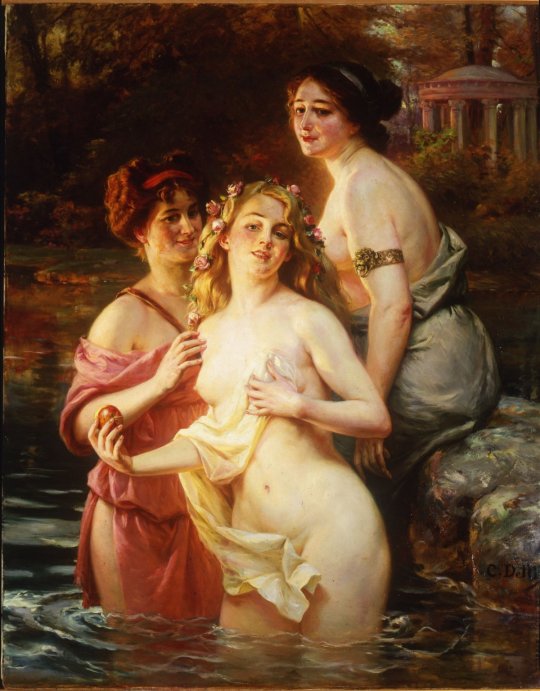#classical culture
Text
I'm really tired of seeing modern depictions of Hades represent him as this 'ruthless, heartless, sexy alpha male'. Like, I understand you're unhappy in your marriage Meredith, but I don't know how to properly explain to you that that man was effectively an accountant. He named his dog Spot.
Not that there can't be sexy accountants, but that man isn't going to add any spice to your life unless it's in the hot chocolate he makes you.
#i didnt spend 4 years getting a degree in this shit just to suffer middle aged women swooning over a man with that much social anxiety#hades#greek mythology#classical culture#honeytalks
18 notes
·
View notes
Link
#odissi dance#odissi#classical dance#Classical Culture#Odissi dance style#Information about Odissi dance
9 notes
·
View notes
Text
i do unironically think the best artists of our generation are posting to get 20 notes and 3 reblogs btw. that fanfic with like 45 kudos is some of the best stuff ever written. those OCs you carry around have some of the richest backstories and worldbuilding someone has ever seen. please do not think that reaching only a few people when you post means your art isn't worth celebrating.
#i often wonder about how many things would be considered classic or high art had they only received the marketing#how many short films that were made for class could have been the most powerful thing you'd ever seen? if you'd seen them?#“you know the greatest films of all time were never made” etc etc#but like. these works of art ARE being made. it's just enjoyed by a smaller audience with equal impact though#i think about this one furry i used to follow on insta who had the coolest worldbuilding ever. it's been years.#thought prompted by that sketch of nimona from ten years ago that was just for a character design#posted to the creator's tumblr and now it's nominated for best animated feature film at the oscars#and by the genuine emotional reaction a fan comic made me feel. how much work had gone into it. how beautiful it was to me.#idk what to tag this but i hope whoever needs to hear it does#writing#writer#fandom#fandom culture#artist
58K notes
·
View notes
Text
the fact that shakespeare was a playwright is sometimes so funny to me. just the concept of the "greatest writer of the English language" being a random 450-year-old entertainer, a 16th cent pop cultural sensation (thanks in large part to puns & dirty jokes & verbiage & a long-running appeal to commoners). and his work was made to be watched not read, but in the classroom teachers just hand us his scripts and say "that's literature"
just...imagine it's 2450 A.D. and English Lit students are regularly going into 100k debt writing postdoc theses on The Simpsons screenplays. the original animation hasn't even been preserved, it's literally just scripts and the occasional SDH subtitles.txt. they've been republished more times than the Bible
#due to the Great Data Decay academics write viciously argumentative articles on which episodes aired in what order#at conferences professors have known to engage in physically violent altercations whilst debating the air date number of household viewers#90% of the couch gags have been lost and there is a billion dollar trade in counterfeit “lost copies”#serious note: i'll be honest i always assumed it was english imperialism that made shakespeare so inescapable in the 19th/20th cent#like his writing should have become obscure at the same level of his contemporaries#but british imperialists needed an ENGLISH LANGUAGE (and BRITISH) writer to venerate#and shakespeare wrote so many damn things that there was a humongous body of work just sitting there waiting to be culturally exploited...#i know it didn't happen like this but i imagine a English Parliament House Committee Member For The Education Of The Masses or something#cartoonishly stumbling over a dusty cobwebbed crate labelled the Complete Works of Shakespeare#and going 'Eureka! this shall make excellent propoganda for fabricating a national identity in a time of great social unrest.#it will be a cornerstone of our elitist educational institutions for centuries to come! long live our decaying empire!'#'what good fortune that this used to be accessible and entertaining to mainstream illiterate audience members...#..but now we can strip that away and make it a difficult & alienating foundation of a Classical Education! just like the latin language :)'#anyway maybe there's no such thing as the 'greatest writer of x language' in ANY language?#maybe there are just different styles and yes levels of expertise and skill but also a high degree of subjectivity#and variance in the way that we as individuals and members of different cultures/time periods experience any work of media#and that's okay! and should be acknowledged!!! and allow us to give ourselves permission to broaden our horizons#and explore the stories of marginalized/underappreciated creators#instead of worshiping the List of Top 10 Best (aka Most Famous) Whatevers Of All Time/A Certain Time Period#anyways things are famous for a reason and that reason has little to do with innate “value”#and much more to do with how it plays into the interests of powerful institutions motivated to influence our shared cultural narratives#so i'm not saying 'stop teaching shakespeare'. but like...maybe classrooms should stop using it as busy work that (by accident or designs)#happens to alienate a large number of students who could otherwise be engaging critically with works that feel more relevant to their world#(by merit of not being 4 centuries old or lacking necessary historical context or requiring untaught translation skills)#and yeah...MAYBE our educational institutions could spend less time/money on shakespeare critical analysis and more on...#...any of thousands of underfunded areas of literary research i literally (pun!) don't know where to begin#oh and p.s. the modern publishing world is in shambles and it would be neat if schoolwork could include modern works?#beautiful complicated socially relevant works of literature are published every year. it's not just the 'classics' that have value#and actually modern publications are probably an easier way for students to learn the basics. since lesson plans don't have to include the#important historical/cultural context many teens need for 20+ year old media (which is older than their entire lived experience fyi)
23K notes
·
View notes
Text
I love you people going into "useless" fields I love you classics majors I love you cultural studies majors I love you comparative literature majors I love you film studies majors I love you near eastern religions majors I love you Greek, Latin, and Hebrew majors I love you ethnic studies I love you people going into any and all small field that isn't considered lucrative in our rotting capitalist society please never stop keeping the sacred flame of knowledge for the sake of knowledge and understanding humanity and not merely for the sake of money alive
#classics#mythology#ancient greek mythology#ancient roman mythology#comparative literature#latin#hebrew#ethnic studies#fuck capitalism#communism#i love my useless degree idc#academia#university#dark academia#Greek#philosophy#liberal arts#humanities#women and gender studies#cultural anthropology
35K notes
·
View notes
Text


Allegorical Scene from Dante’s Inferno
— by Cyprian Kamil Norwid
#painting#art#art history#oil on canvas#oil painting#artblr#fine art#classical art#dark academia#appalachian gothic#classic academia#chaotic academia#goth#gothic#appalachian culture#dark art#spooky#mythology#mythological creature#mythological creatures#artist#art community#art gallery#art blog#artists
5K notes
·
View notes
Text

The three Graces, c. 1911
By Cesare Agostino Detti
#art#painting#fine art#classical art#italian art#italian painter#italian artist#beauty#oil painting#grace#women#mythology#greek mythology#mythological art#greek culture#aesthetic#european art#european mythology#20th century art#female figure
2K notes
·
View notes
Text
*completely serious tumblr user voice* oppression was actually invented by Big West sometime in the 1800s. no one was oppressed anywhere before that.
#re: that classical faggotry post#also the way ppl talk abt colonized cultures' practices....#i swear u dont have 2 pretend everybody loved gays n trans ppl as a way to say they didnt ''deserve'' colonialism#mine*
1K notes
·
View notes
Photo


Christianity, Culture, and Fifth Columns
I came across this scribbled note (above, second image) on a flyleaf of my fading paperback copy of Charles Norris Cochrane’s Christianity and Classical Culture while sorting through boxed-up books. I vaguely recall that I found the numbers in Harper’s Magazine, either in the feature “Harper’s Index” or in Lewis Lapham’s always wordy “Editor’s Note.” Lapham, the past on-off-on editor of our country’s oldest magazine, used to boast that his family owned around 25% of California’s real estate at one point. He was first a Rightie, then a Leftie, then a Who-Knows-Whatie. And something of an alarmist and provocateur.
$2.5M isn’t that much money, really—it was not a vast sum even then. I suspect the net was deliberately cast wide to alarm the reader by implying the presence of a fifth column rather than furnishing evidence for an actual argument. And 420K isn’t that dense of a concentration out of 1986′s total 243M US population. Perhaps a newer set of numbers intersected with another significant indicator would argue the same point more effectively. Regardless, if evidence had shown these men to be patriots willing to die defending the Republic, the stats would have been reason to cheer.
As for Cochrane, I first encountered his work as a high school student, though I didn’t come across it on my own. In those lost days, some major universities customarily allowed scruffy high school kids like me to rummage through their stacks. Some librarians were even willing to assist, and if a current student was willing to lend his library account, kids could borrow books. And so I went to Duke searching for sources on the influence of other religions on Christianity in the hope of proving in my senior paper that our common religion was, to a significant degree, an assemblage of forms and beliefs borrowed from other religions.
A librarian very helpfully showed me how to cross-reference using the card catalog (lol), then she assisted me in pinning down likely sources for my paper, one of which turned out to be Cochrane. As she rightly pointed out, some books are so complete that they furnish evidence for arguments pro and con their own theses, as well as valuable context on their subject and period. Cochrane’s extensive quotations of Celsus and others provide great insight into contemporary pagan criticism of the early church. Obviously, there are more direct ways to criticize an Abrahamic religion, e.g., “You can’t produce empirical evidence of the supernatural and there’s no logical argument for it that stands up,” blah blah, but I was trying to address the religion on its own terms and demonstrate something about its origins.
While I was not ignorant of the normal process of syncretism, I felt that the religion’s absorption of pagan rituals alters the idea many people have of Christianity’s unique status. Since I was in full-tilt rebellion against my parents and their religion and our nation’s then-dominant culture, writing this paper felt like a great Blow Against the Empire—if you know what I mean. I was seventeen.
I thought it was one thing for the church to have transformed the winter solstice (and in some European cultures, the traditional “birthday” of Apollo) into Jesus’s birthday, but entirely another that the Christian sacrament of baptism was likely taken from the mystery cult of Mithras, a competitor religion once very popular in the Roman army, in which the central rite involved placing the initiate in a pit and dripping the blood of a slain bull over him. Thereafter, he had been bathed in the blood of the bull and so was “reborn.”
Yes, it is true that in Christianity the ritual is symbolically and semantically transformed from its Mithraic source into the blood of the lamb. My underlying point was that if a belief system can’t generate its own rite of initiation then something is fundamentally lacking. Specifically, the Christian claim to be a unique revelation of the Deity is vitiated if it has needed to import central elements from other belief systems.
I suppose what started this ball rolling would have been the hot summer Sunday—I was perhaps five years old—when the pastor of my parents’ Methodist church stood pounding the lectern, sweat dripping from his brow, and bellowed, “Hell! They will burn in Hell! And the saved will look down from Heaven and sing ‘Hosannah’ to God!” I couldn’t have articulated the matter at the time, but the very physicality of this dubious “afterworld” troubled me, as well as the obvious contradiction between the command to love one’s neighbor and the barbaric revenge fantasy he was enjoying. By the time I reached puberty I was primed to rebel.
These days, I don’t claim to be conventionally religious at all. I do have an abiding interest in the conception of the self found in Mahayana Buddhism; I am particularly fascinated by Nagarjuna’s Wisdom of the Middle Way. The idea that one can “put down the burden” of the self by recognizing its contingent nature offers hope of a spirituality able to address our existential dilemma as self-knowing creatures who live with a temporal beginning, middle, and end.
But I can’t claim to have made a perfectly clean break from Christianity, either. Today, the Hyper-Conformist, Upper-Middle-Class Left has co-opted and transformed the faith into an expression of their Social Justice religion. Meanwhile, certain elements of both Left and Right have made a pastime of using the religion’s remains as a practice target, harmless gate post that it has become. I confess that I feel sympathetic nostalgia for the old version I grew up with, and I periodically struggle to formulate a workable separate peace with it. There are worse doctrines than Love, even if that is not all one needs. And frightening people a little to keep them from hurting others is not the worst of sins.
In that spirit, I recently thumbed through Marcion of Sinope’s first transcription of the Bible. This earliest version of the gospel is a very thin record of Jesus healing the sick and raising the dead while other people stand by expressing their amazement, the implication being that magical powers prove divinity. There’s not an awful lot more going on. It’s embarrassing, actually. I was reminded of reading excerpts of the Synoptics in the original Koine at college, and coming to understand why King James I enjoined his scholars and poets to “clad the book in the rich raiment that it deserves,” or words to that effect. The original text is not remotely literary, nor is it even persuasive. I keep coming back to the idea that somehow an interpretation can be made that will shore up its weaknesses while accessing its strengths, but that task is quite beyond me.
If all you’ve got is a fictional record of superpowers, then you’ve got too little in today’s world to work even as a rhetorical touchstone—which is perhaps the most serious problem that we, the European peoples, have in our post-Christian diaspora. We have lost our center, and there is nothing on the horizon to take its place except the tyranny exercised by the very real fifth column that has succeeded in leveraging our homelands and our lives in the last thirty years.
The ancient religion may have been riddled with irrational prejudices and superstitions, but for all its faults it held at bay a Pandora’s box of evils that have emerged since its collapse—perhaps that protective shield was Christianity’s greatest virtue. The new culture, with its atheism, scientism, coercion and speech prohibitions, while free of supernatural absurdities, is shot through with a duplicity and a vile vulgarity without precedent in living memory. At present, it is tending toward an international totalitarian regime much harsher than the relatively mild strictures that I rebelled against in my youth. Either we find some set of ideas to rally around or we are finished. It’s really one Hell of a time we’re having, isn’t it?
1 note
·
View note
Text

The Working Girl, Daniel Varoujan (translated by Alice Stone Blackwell)
#armenian literature#armenian poetry#daniel varoujan#quotes#literature#poetry#classic literature#poems#translated literature#armenian culture
792 notes
·
View notes
Text

#culture#nostalgic#2000s nostalgia#nostalgia#music#rap#hip hop#pop#rock#classics#neptunes#pharrell#2000s#skateboard p#nerd#bbc#ice cream#bape#billionaire boys club#fashion#human race#artist
5K notes
·
View notes
Text

#lisa raye#diamond#black culture#black movies#black moodboard#black actresses#hood classic#beautiful black women#black women beauty#black woman beauty#pretty black woman#black woman#black women#pretty black girls#beautiful black girl#black girl moodboard#black girl aesthetic#pinkcore#90s vibes#90s aesthetic#90s movies#90s nostalgia#90s films
713 notes
·
View notes
Text
youtube
Watch the American Climate Leadership Awards 2024 now: https://youtu.be/bWiW4Rp8vF0?feature=shared
The American Climate Leadership Awards 2024 broadcast recording is now available on ecoAmerica's YouTube channel for viewers to be inspired by active climate leaders. Watch to find out which finalist received the $50,000 grand prize! Hosted by Vanessa Hauc and featuring Bill McKibben and Katharine Hayhoe!
#ACLA24#ACLA24Leaders#youtube#youtube video#climate leaders#climate solutions#climate action#climate and environment#climate#climate change#climate and health#climate blog#climate justice#climate news#weather and climate#environmental news#environment#environmental awareness#environment and health#environmental#environmental issues#environmental justice#environment protection#environmental health#Youtube
6K notes
·
View notes
Link
#bharatanatyam#classical#classical culture#classical dance#dance history#dancers#Indian dance#tamil nadu#dance form
9 notes
·
View notes
Text
Aimsey: [While watching a Hideduo compilation, and seeing Fit message Pac "It's going to be ok"] Aww... That's fcked! Wait, what is it? "Sau–" wait, hold on. How do you say that? "Saudades?"
[He plays a clip of someone pronouncing Saudades and repeats the word several times to copy the pronunciation]
Aimsey: Ohhh, nostalgia! [Reading the definition] "Saudades is a word in Portuguese that claims no direct translation in English. However, a close translation in English would be "desiderium," defined as an ardent desire or longing, especially a feeling of loss or grief for something lost."
Aimsey: It's like "Hiraeth," yeah! It's like the Welsh word! Guys, I can teach you something! Wait- wait- wait– Chat I can teach you something!!! So, in Wales, in Welsh, we have a similar word! We have a similar word, ok? Um... [She plays an audio clip of someone pronouncing "Hiraeth"] Ok, ok, hold on, hold on. We have a similar word, yeah. So, in Welsh, there is the term "Hiraeth," which is a home– ok, I'm gonna explain: "Hiraeth" is a homesickness– lemme, lemme say it in chat... [They type out the word and verbally spell it out letter by letter] I'm gonna spam it.
Aimsey: SO! In Welsh, we have a very similar word, and the- like, the description for it is basically a deep longing for something, especially someone's home. And it's like a homesickness. [Pauses] And there are no direct English translation, but it basically mean like, a homesickness tinged with grief and sadness over the lost or departed. [Reading chat] Yes, you're all saying it right! Yeah, you're all saying it right! You're all saying it right!

Aimsey learns what "saudades" means, and teaches chat a similar word in Welsh. One of my favorite things about QSMP is seeing people learning about other cultures and seeing them get SO EXCITED when they get an opportunity to share their own culture or language with others :')💕
#AimseyTV#QSMP#Aimsey#December 17 2023#this is ~ 39 minutes into the VOD#Which is on their VOD YouTube channel and is titled “I Became A QSMP Purgatory Expert! (REACTION)”#Anyways. I love seeing people getting excited about their culture and learning about other people's cultures#but also it kills me that this was prompted by a frickin hideduo compilation video LMAO#Classic QSMP moment
428 notes
·
View notes

